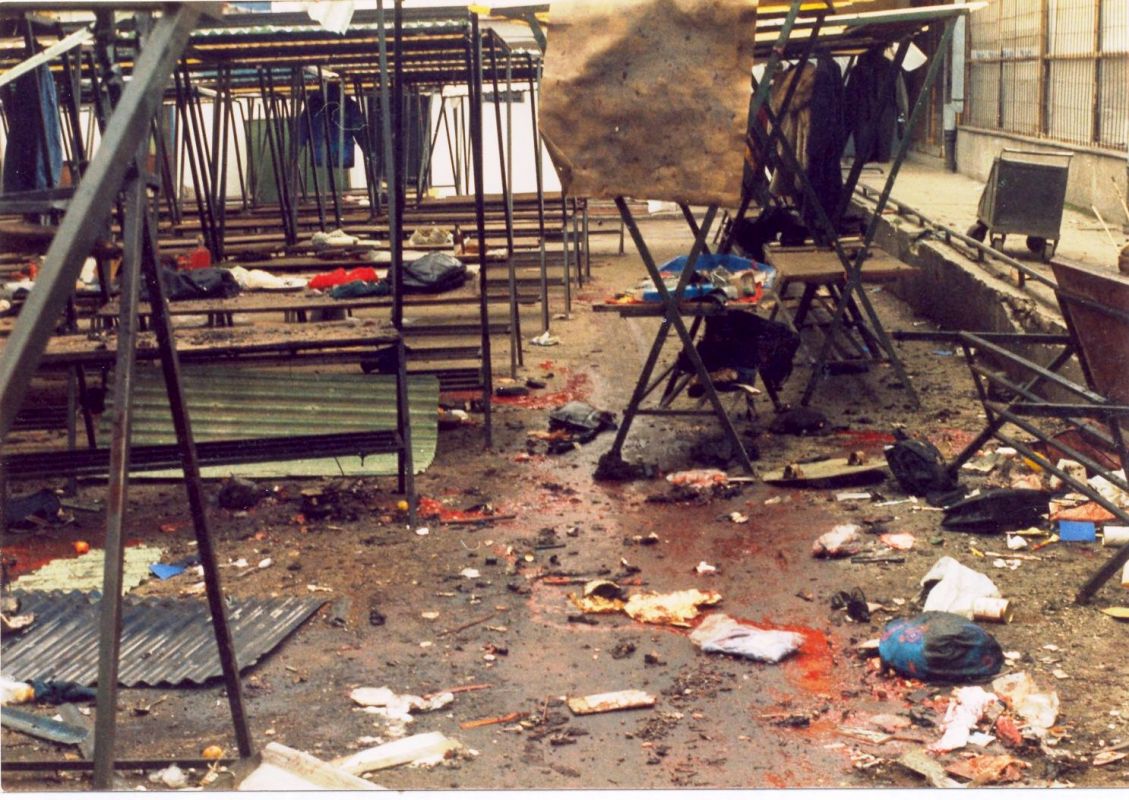Written by: dr. sc. Merisa Karović-Babić
The market and the open Markale market across from it, a place with a trading tradition of more than a hundred years, was on several occasions the target of shelling during the siege of Sarajevo from the positions of the Sarajevo-Romanian Corps of the Army of the Republika Srpska (SRK VRS). Given that many shops, supermarkets and grocery stores in the city were closed, the markets were almost the only places where citizens could get basic food, and at the same time the places where they gathered en masse, exchanging their survival experiences, war recipes and buying not so cheap products.
On February 5, 1994, a few minutes after noon, a grenade was fired from the position of the SRK from the direction of Mrković and exploded on the asphalt surface inside the Markale green market at a time when several hundred citizens were present in the market. According to data from the Clinical Center, the State Hospital and the French Battalion Hospital in Sarajevo, as well as burial societies in Sarajevo, a total of 67 civilians were killed and 139 wounded as a result of the explosive and shattering effect of the shell, while as a result of the injuries, being treated in Hamburg, death occurred for one more person. (Therefore, it was a total of 68 killed civilians).
In the investigation carried out immediately after the massacre by members of the MUP, headed by the investigating judge of the High Court in Sarajevo, it was established that it was a 120 mm mortar projectile that was fired from the north-northeast direction, where the "aggressor positions Mrkovići" are located ''. The same was confirmed by the Commission of Experts formed by order of the High Court in Sarajevo, which made a special Elaborate, as well as the later expertise of Prof. Ph.D. Berko Zečević for the ICTY Prosecutor's Office.
Immediately after the massacre, violent reactions followed, primarily from the Serbian and Serbian military and political leadership in terms of denying responsibility for firing the grenade, with a shameful insult to the dignity of the victims and their families by stating that it was "textile and plastic dolls". Consensus on the ways of denying the aforementioned responsibility was not reached, and several theses were put in public: that "the mine was thrown from a nearby building", that it was a "pre-prepared explosive", that "the grenade was fired by the Croats", which was an attempt to send a message to the world public that everyone but the Serbs are to blame for the massacre at Markale. Thus, for example, the Chief of the General Staff of the Yugoslav Army, General Momčilo Perišić, at the 18th session of the Supreme Defense Council of the FRY, on February 7, 1994, stated that he assumed that "Mujahideen did it", and "it is not excluded that the Croats also did it." General Perišić is only certain that "it is impossible that the Serbs in Sarajevo set it up, except from a distance."
Four days after the shelling of the market, in response to threats of NATO bombing of VRS positions, SRK commander Stanislav Galić, on the basis of a previous order from the General Staff of VRS, ordered that all units of SRK use "blackmail and pressure in with the aim of stopping the airstrikes", and if they happen, the forces of UNPROFOR and all foreign humanitarian organizations that were in the territory of the RS at that moment should be "attacked (not killed), captured and held as hostages , until NATO stops the airstrikes.'' it will never be known who actually fired the deadly grenade...'', and that the accuracy of the hit was ''the random luck of whoever was shooting,'' or that the investigations into the shelling were ''insufficient at this stage.'' Radovan Karadžić knew how to appreciate this kind of no determination, and as a guest on the Special Show of Serbian Radio Television, he stated: "We are satisfied that we have the United Nations, with which we arrange all these affairs."
Conclusions about guilt, almost 10 years after the crime, were made by the ICTY trial panel in the Galić case, stating that the grenade in Pijac was "beyond any reasonable doubt intentionally fired from the territory under the control of the SRK," which was also confirmed by the ICTY Appeals Panel in the specified subject. However, the vague and vague reactions of the United Nations officials about the responsibility of "both sides for the crime" perfectly fit the political and military context of the time and corresponded to the current state of UNPROFOR forces on the ground. Thanks to the "non-identification" of the perpetrator of the crime in Markale by the official investigations of the United Nations, concrete action was once again avoided, and with the apparent withdrawal of heavy weapons or their placement under the control of UNPROFOR, sniping continued very quickly, and after a short break and shelling of civilian targets in the city. The views of the ICTY trial and appeals panel in the Stanislav Galić case, regarding the positions of the "SRK" as the place where the grenade was fired, should serve to put an end to manipulations about this crime. However, the theses of the suspects for this crime, part of the political leadership of Republika Srpska, as well as their lobbyists in the world, that the massacre was staged, are still present, without any hint of any sanctions for deniers of the crime and insulting the dignity of the victims.
Part of the text published in Avaz newspaper
